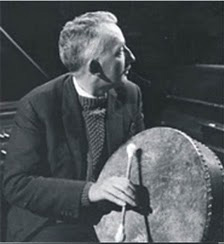Grip Postures
These grip postures were explored in daily practice over the course of this research, and are used within my creative process of Grip Switching. The letter codes I use to annotate staff notation for the "up" and "down" strokes of each grip posture are also given. Up and down lose meaning for some of the grip postures (for example Ó Riada and Reverse Ó Riada), and can instead be thought of as "strong" and "weak" strokes. Strong strokes usually fall on an accented beat, and weak strokes usually fall on unaccented beats, but this need not always be the case. Further context for the information in this table is found in the Bodhrán Literature and Practice Review and Notation sections.
| Cunningham's Categorisation | My Categorisation by Exemplar | Exemplar in Performance | My interpretation of the grip posture | |
| "Down" Stroke (strong) | "Up" Stroke (weak) | |||
| Kerry Style (two-ended) | Mercier, after Peadar Mercier of Dublin. Ubquitous. |
v |
ʌ |
|
| West Limerick Style (one-ended) | O'Donoghue, after Séamus O' Donoghue of Roscommon (rare) |
d |
p |
|
| Waterford Style (two-ended) | Mel Mercier, after Mel Mercier of Dublin. Very similar to Peadar Mercier style but with use of loop to attach stick to the middle finger. Rare) | |||
| Tambour Technique (two-ended) | Ó Riada, after Seán Ó Riada of Cork. Also used by Éamonn de Buitléar, a musical collaborator of Ó Riada. Rare. |  |
r |
ɹ |
| A style peculiar to Tommy Hayes (two-ended) | Hayes, after Tommy Hayes of Limerick. Rare. |
h |
ɥ |
|
| Matched grip fill technique (one-ended) | John Joe Kelly fill, after John Joe Kelly of Manchester. Well-known technique but not currently the basis of a style in its own right. |
k |
ʞ |
|
| McNamara, after Stevie McNamara of Clare. | ||||
| Reverse Ó Riada. A grip posture that I developed. To my mind it uses a similar wrist action to the Ó Riada posture, but with the wrist turned upside-down. The unaccented stroke (ʎ) is quite similar to the accented stroke in the Mercier posture (v). |
y |
ʎ (≃v) |
||









